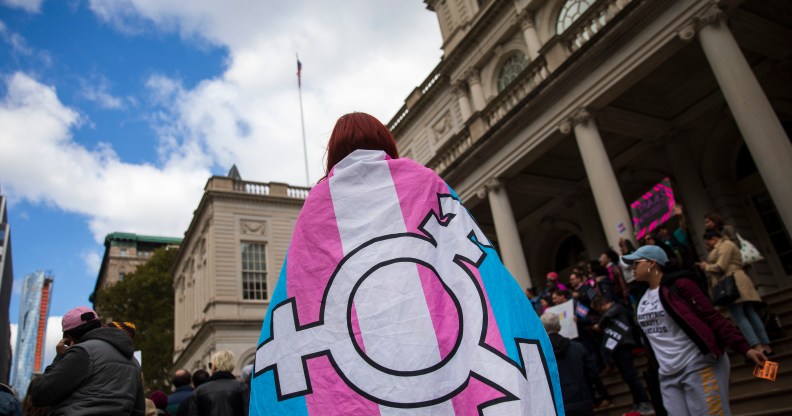How 2018 became the year of trans persecution

A person draped in a transgender flag. (Drew Angerer/Getty)
As part of PinkNews’ year-end review of 2018, activist Christine Burns MBE reflects on the unprecedented hostility towards trans people in the last 12 months.
In May 2014, Time magazine featured trans actress Laverne Cox on their front cover and declared the arrival of a “trans tipping point.” American Vogue described 2015 as “the year of trans visibility.”
For someone like myself, intimately aware of the place of trans people in culture since my teens in the 1960s, and having been a leading campaigner for almost 30 years, these were monumental events and you might forgive me for thinking by September 2016, when pitching an anthology-based history of trans emergence in Britain, that I was going to be putting together a retrospective on a community whose story of emergence and freedom was almost over. We felt like the worst was behind us.
How could I have been so wrong, so prematurely relaxed?
2016 was a year historians will be writing about in a hundred years, of course, just as we look now on the origins of the First World War. Who could have predicted the emergence of a very ugly kind of populism, fuelled by economic grievance but weaponised by the production of easy scapegoats? Foreigners. Nationalism. The EU. Experts. Brexit was already a reality by the time I sat down to pitch my story about a community whose history goes back far longer than most people imagine. And Trump was just about to unexpectedly win the presidency, helped in large part by his policies designed to placate angry evangelicals, right wing neoliberals and actual Nazis and white nationalists. Still, you’d have thought that was far away and unlikely to touch us, eh?
Two significant events then happened: One public and one that we are only now figuring out.
In April 2017, Theresa May called a snap General Election. All three parties made manifesto commitments to reform the Gender Recognition Act (GRA). Indeed it was the Tories’ only LGBT manifesto commitment. In October that same year May made the elimination of medical evidence in GRA applications part of a speech at the Conservative Annual Conference. The idea of ‘Self-ID’ (a really bad choice of words) was on the table as potential government policy.
Less obvious to us in Britain, that same month, the US right wing’s Values Voter Summit — an annual strategic planning jamboree for anti-LGBT interests — was discussing the need to switch focus onto splitting the LGBT alliance, by targeting all their guns on trans people. Attacking trans people was to be the way of regrouping and rallying the troops after losing their war on equal marriage.
Correlation isn’t causation — a smoking gun (if it exists) is yet to be uncovered — but it was shortly after these two seemingly disconnected events that the current controversy about trans people and our rights became really unpleasant in Britain. And that became the backdrop for the whole of 2018.
“2018 has been defined by a campaign against trans people and anyone identified as a possible ally.”
— Christine Burns
Groups that nobody had ever heard of before suddenly emerged, with glossy websites registered in the US, claiming to represent mainstream women’s interests. Questions have been raised about some of their funding. The ‘Feminist’ section of Mumsnet became the unofficial base for radicalising ordinary women who knew no more than what the leading figures were telling them.
And those leaders found a ready ear in some of Britain’s right-leaning press — so much so that there was barely a Sunday in 2018 when the Sunday Times (and sometimes the Mail) was not running story after story hostile to trans people, with no effective right of reply. “We’re being silenced,” cried the people silencing trans people. This peaked as first Scotland and then Westminster conducted public consultations on how to improve the GRA.
Everything else is just detail. 2018 has been defined by a campaign against trans people and anyone identified as a possible ally. Everyone agrees it is unprecedentedly toxic but, just as Donald Trump pretended after Charlottesville, this is not an issue where ‘both sides’ can be considered equivalent.
How will it end? At the moment I don’t know. I pray that some of the blatant stirring by anti-trans campaigners doesn’t lead to physical violence. 2019 will be horrible, set against a political and economic landscape that may be nothing short of apocalyptic. At such times it is easy to make scapegoats. My prayer for the year ahead is that we — trans people — are not ‘it.’
Christine Burns MBE is an author and trans activist. Her book, Trans Britain: Our Long Journey Out of the Shadows, is available now via Unbound.

